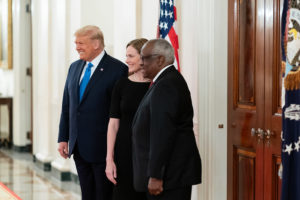
President Donald J. Trump poses for a photo with Supreme Court Associate Justices Amy Coney Barrett and Clarence Thomas in the Cross Hall of the White House Monday, Oct. 26, 2020, after attending Barrett’s swearing-in ceremony as Supreme Court Associate Justice. (Official White House Photo by Andrea Hanks)
Unlike Democrats, who wasted their commandeering of one of America’s two major parties, Republicans have something to show for it. Daniel Henninger invites your optimism, guarded or provisional, starting with the Supreme Court.
SCOTUS & Federalism
The justices ended their term with two historic decisions—Dobbs v. Jackson Women’s Health Organization and West Virginia v. Environmental Protection Agency. “Historic” is an abused word, but if it means a dramatic shift from a long status quo, these decisions qualify.
Dobbs greatly restores the arbitrating role of the states. For decades, the left has resisted entrusting authority to the states for anything. Suddenly, federalism is more than an idea discussed in seminars.
Diversity’s New Meaning
Some states, such as Oklahoma, are implementing bans on abortion. But in a referendum Tuesday, Kansas voters chose to continue the state’s abortion status quo. Diversity has a new meaning.
The EPA & Regulation of Businesses
In West Virginia v. EPA, the high court has limited the ability of federal bureaucracies to “extend laws beyond Congress’s explicit intent,” continues Mr. Henninger.
The court’s watershed change of direction was explained clearly in a long piece on the front page of the New York Times beneath the headline: “E.P.A. Ruling Is Milestone in Long Pushback to Regulation of Business.”
The writer described a memo written to the U.S. Chamber of Commerce more than 50 years ago by Lewis Powell, later elevated to the Supreme Court: “His memo set out a blueprint to fund a movement to turn public opinion against regulation by equating ‘economic freedom’ for business with individual freedom.”
Free People, Free Markets
The article cites conservative think tanks advocating the elevation of economic freedom, such as the Heritage Foundation and the American Enterprise Institute. The result was last month’s decision. We at the Journal editorial page—working beneath the motto “free people, free markets”—are happy to join in the victory lap.
Crime
Is crime in America totally out of control? Not quite, argues Mr. Henninger.
Voters are moving to regain control of criminal justice and their own safety. San Franciscans just recalled progressive District Attorney Chesa Boudin. An effort to recall Los Angeles County District Attorney George Gascón has collected more than 700,000 signatures.
Mr. Henninger’s colleague at the WSJ, Kimberley Strassel, noted recently how voter efforts to turn back progressive prosecutors have succeeded in local elections in Nevada, North Carolina, Oregon, and Utah.
This week in the WSJ, George Soros explained why he would continue to fund progressive prosecutors. “His money worked once but now, not so well,” observes Mr. Henninger.
In Florida, Gov. DeSantis suspended the Soros-backed prosecutor for failing to prosecute criminals. The Florida constitution grants the governor the ability to suspend county officials, with legislative review of the action.
New York City is out of voter luck. Despite electing anticrime Mayor Eric Adams, timid fellow Democrat Gov. Kathy Hochul is the only person who can remove the progressive district attorneys making prosecution noncalls in four of the city’s five boroughs. For now, New Yorkers can read headlines such as this last week in the Times: “Brooklyn Bishop Robbed by Three Armed Assailants While Delivering Sermon.”
Read more about DeSantis’s efforts to maintain law and order here.
Dysfunctional Schools?
A positive lesson emerging from the pandemic’s two long years is that people are impatient with dysfunction. They want the U.S. system to work. That includes the schools.
The union-led mass closing of public schools during the pandemic was a rare political event that simultaneously touched millions of people in an area of life normally taken for granted. No longer.
Parental unrest over the schools emerged most prominently last year in Republican Glenn Youngkin’s defeat of Terry McAuliffe in Virginia’s gubernatorial contest.
Even more telling was New Jersey, where Republican Jack Ciattarelli nearly defeated Gov. Phil Murphy. In no state did unions shut down the schools more tightly than blue New Jersey. Incensed parents filed lawsuits against districts to reopen the schools, and many of them voted for Mr. Ciattarelli.
In closing, Mr. Henninger reminds readers how the past two years have seen “remarkable momentum and growth in the states for the school-choice movement, which in great part is a consequence of anger over the damaging shutdowns.”
If you’re willing to fight for Main Street America, click here to sign up for the Richardcyoung.com free weekly email.





